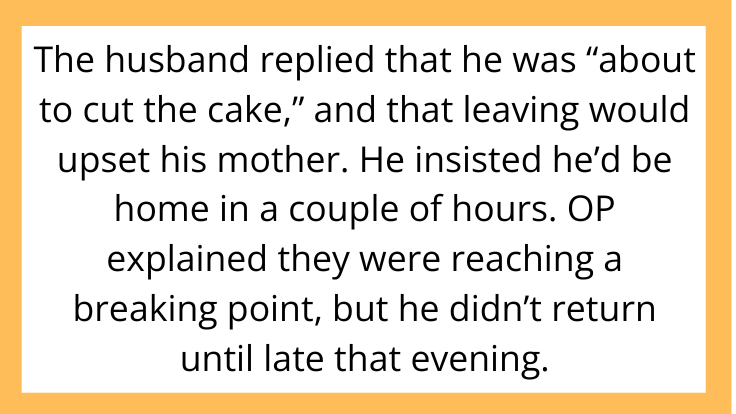AITAH for Asking My Husband to Leave His Mother’s Birthday Early to Help Me With Our Newborn?
When it comes to balancing family obligations and parenting, conflicts are inevitable. One Reddit user recently shared their struggle on the r/AITAH community: Should they have insisted their husband cut his mother’s birthday short to come home and help with their newborn baby? Let’s dive into this real-life scenario, the perspectives involved, and whether this request was unreasonable—or simply necessary.
The Situation: A New Parent Overwhelmed

The original poster (OP) had just given birth three weeks before the incident. As many parents can relate, those early days are an exhausting blur of sleepless nights, constant feeding, and physical recovery.
On the day in question, OP’s husband planned to attend his mother’s 60th birthday party, which was an hour away. OP had agreed he could go, as long as he didn’t stay too late. But when the baby was extra fussy and OP began to feel unwell, they called and asked if he could come home sooner than planned.
The Conflict: Family Milestone vs. Immediate Needs

The husband replied that he was “about to cut the cake,” and that leaving would upset his mother. He insisted he’d be home in a couple of hours. OP explained they were reaching a breaking point, but he didn’t return until late that evening.
When he arrived, OP was furious and accused him of prioritizing a party over his exhausted wife and newborn child. The husband, in turn, said OP was being unreasonable and disrespectful of his mother’s milestone celebration.
The argument escalated, and soon the entire extended family was weighing in. Some said OP should have been more understanding. Others agreed the husband needed to step up as a parent.
Balancing New Parenthood and Family Commitments

This scenario resonated with thousands of Redditors because it highlights a challenge so many couples face: How do you balance your own family unit with the expectations of relatives?
The Reality of Newborn Care
Caring for a newborn is one of the most demanding periods in any relationship. According to pediatric experts, the first six weeks are marked by:
-
Postpartum recovery (especially if the birth was complicated)
-
Sleep deprivation that can impact mental health
-
Breastfeeding challenges and round-the-clock feeding
-
Emotional upheaval as hormones regulate
Many commenters pointed out that, in this context, OP’s request wasn’t just about “not wanting to be alone.” It was about reaching a point of desperation that required immediate support.
The Husband’s Perspective: A Milestone Event

On the other hand, the husband saw his mother’s 60th birthday as a once-in-a-lifetime occasion. He felt torn between being present for his family of origin and supporting his spouse. Some readers empathized, noting that he had already planned the visit and communicated his timeline.
However, most agreed that emergencies (or moments of crisis) should take priority over social commitments.
What the Community Decided

On r/AITAH, the majority verdict was that OP was not the jerk. The top-voted comment summed it up:
“When you have a newborn, your priorities shift. A party—no matter how special—doesn’t outrank your spouse reaching out for help.”
Others recommended the couple attend counseling to set clearer expectations about support and communication, especially during life transitions.
Key Takeaways for New Parents

If you’re navigating a similar conflict, here are a few strategies that can help:
1. Have Clear Conversations in Advance
Before events or commitments, talk honestly about:
-
What situations warrant coming home early
-
What constitutes an “emergency”
-
How you’ll stay in touch throughout the day
2. Use Specific Requests
When you’re overwhelmed, be direct: “I need you home within the hour because I’m feeling sick and unsafe.”
Vague requests like “I’d rather you come home soon” can lead to misunderstandings.
3. Understand Each Other’s Priorities
Remember, neither person is automatically wrong for caring about different things. The challenge is aligning those priorities when circumstances change.
How to Prevent Resentment

Moments like these can build resentment if left unresolved. Consider scheduling a calm conversation to discuss:
-
What you both expect in emergencies
-
How to balance extended family obligations with immediate family needs
-
What support looks like in practical terms
Many couples find it helpful to create a “postpartum support plan,” similar to a birth plan, outlining who does what during the first months.
Conclusion: Is Asking for Help Selfish?

This situation is a powerful reminder that asking for help when you’re at your limit isn’t selfish—it’s responsible. While milestone celebrations matter, a newborn’s care and a recovering parent’s wellbeing often must come first.
If your partner is struggling to see this, it might be time to re-evaluate how you communicate and support each other.



